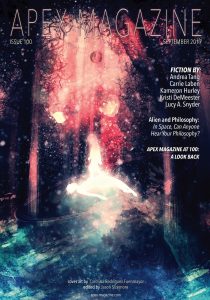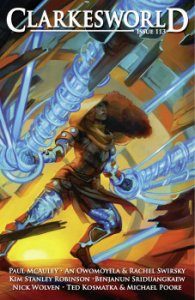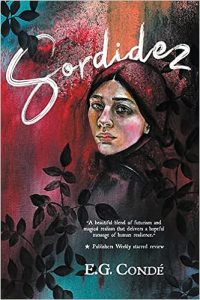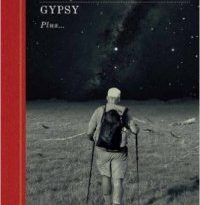Paula Guran Reviews Short Fiction
Apex 9/17, 8/17
Black Static 9-10/17
Uncanny 9-10/17
The Dark 8/17
Nightmare 10/17
Beneath Ceaseless Skies 8/17
 As of September 2017, Apex Magazine has survived for eight years and four months and made it to its hundredth issue – a more remarkable achievement than the average reader might expect. The issue’s three more-or-less originals are all entertaining and dark enough for me to write about.
As of September 2017, Apex Magazine has survived for eight years and four months and made it to its hundredth issue – a more remarkable achievement than the average reader might expect. The issue’s three more-or-less originals are all entertaining and dark enough for me to write about.
Kameron Hurley‘s “Tumbledown” (also published through her Patreon) offers plenty of her trademark action. Set on a cold, bleak, plague-ridden world, it features a heroic paraplegic survivor, who pretty much states the theme with: “except for all of you, my life isn’t that bad. It’s not a horror story. You all just keep making it one with your fear and your pity, holding me up like some kind of totem against what’s happening out there.” Why anyone would want to settle this world is rather a mystery to me, but Hurley is always a good read.
Andrea Tang‘s “The Man in the Crimson Coat” is set in a mega-corporation-controlled dystopia. The titular “man” is a “cyborg” (quibble: it seems to be an android to me, and the author calls it a robot) that is either a super patriot or merciless terrorist. The story is a little too black/white-good/evil, and the ending overly sentimental, but Tang does give us some good noir-ish action. Tang is a new writer, and this example holds up well enough to encourage looking for future work from her.
“The Lightning Bird” by Kristi DeMeester (also in her recent collection Everything That’s Underneath) is based on southern African tribal lore. Gable and her mother, Uma, are amagqhira – diviner/healers. Uma’s prescient dreams are of the joyful events in life; Gable dreams of darker things. Gable nurses her mother through a long illness. Uma dies, but not before asking her daughter to bring her back and providing the disturbing means to do so. This makes one wonder just how “good” mum was/is, and how “bad” the devoted Gable is. The story leaves one wanting more, which means the author has done her job well.
There’s one more from Apex, this from issue #99, which was “A Celebration of Indigenous American Fantasists” and guest edited by Amy H. Sturgis. The stand-out story is a gentle, non-horrific (but dark) ghost story: “If a Bird Can Be a Ghost” by Allison Mills. Shelly’s grandmother comfortably takes care of ghosts, usually dispatching them to wherever they belong. When Shelly must deal with grief herself, the girl learns the dead don’t owe the living anything. It’s an excellent story of love and loss that pulls on the heartstrings.
Writing of anniversaries, Black Static celebrates its tenth anniversary with four dark stories in #60.
“Skyshine (or, Death by Scotland)“, a novella by Carole Johnstone, is a stunner. Roshni is a young woman who has been diagnosed with schizophrenia and institutionalized for five years without much apparent progress. Thanks to a governmental “pilot scheme,” Roshni (who may not, it is intimated, be schizophrenic but definitely suffers from Asperger syndrome, an anxiety disorder, obsessive-compulsive disorder, and clinical depression) is given a placebo along with her genuine medications and therapy. Roshni is soon apparently well enough to be released and credits the pill, which she dubs “Skyshine,” with her “cure.” Roshni is bright, and despite her psychiatric problems – partly because of them – she quickly becomes a sympathetic character. Already obsessed with a “List of Worries,” once exposed to more of humanity and unlimited access to the internet, she becomes convinced there is really only one thing to worry about: men. They seem to be the root of all evil. She stops taking her real meds, and a move from Glasgow to a London suburb ends counseling guidance. London subjects Roshni to even more of the baseness of male behavior. Wherever (even with a prefatory hint) you may think the plot is taking you, you are probably wrong. This is scary on multiple levels. Brava!
Part of Johnstone’s theme is “everyone wants someone[/something] to blame. Especially when the consequences are devastating… are world altering. No one wants to hear that the fault lies with their governments or presidents or prime ministers, or indeed with themselves….” This fits “The Shuttered Child” by Tim Lees as well. Two university lads go to Paris in 1968, where the would-be revolutionaries find French police react to protests with distinct brutality. They flee to a bar where they encounter an older chap who tells them a truly brutal story from the summer of 1913. Life goes on. But the story changed one of the student’s lives, and possibly history, irrevocably. A lot of writers lately are looking for supernatural answers to why the world is in the shape it is currently in – not that one can blame them. This story’s “answer” is deftly done.
In Ray Cluley‘s “The Swans“, a mother and son’s peaceful boat trip on a canal is beset with strange swan occurrences, and inexplicable behavior, and haunted by the past. I don’t advise against reading “The Swans” by any means, as I appreciate the Aickman-esque quality of the story and its atmosphere, but I either need more time to ponder it or this one is too opaque for me.
The conclusion, or some variation thereof, to “Langwell Sorrow” by Stephen Hargadon is pretty much expected, but the local color and characters make getting to it a rewarding experience. The nameless narrator finds old Gary Gorse at a local pub and listens to him grouse about his football (US: soccer) team. Despite his discontent, he exists for the Langwell Sorrow (“Named after a church. Our Lady of the Seven Sorrows on the Lower Langwell Road”) and remains true to the green-and-maroon. The narrator is fascinated and goes off to find Langwell, the church, and the team.
Three of five originals in Uncanny #18 are shadowy enough to fall within my boundaries here.
N.K. Jemisin‘s “Henosis” is a dark little parable about overzealous fandom and the overblown importance of literary fame and awards, with a reference the more common transient nature of writing “success.” There is truth to it, but I worry it may be a bit of a genre publishing in-joke. It’s difficult for biased me to gauge.
“Clearly Lettered in a Mostly Steady Hand” by Fran Wilde is a surreal tour of a surreal place. Lovely writing that does its job of unsettling the reader.
The world, for unknown reasons, has changed in “Though She Be But Little” by C.S.E. Cooney. Emma A. Santiago, a 65-year-old widow, has been transformed into eight-year-old Emma Anne; her friend, Margo, into a pirate. Others have fared more or less well, but everything is two steps beyond bizarre. Some quirky magical “Endowments” are involved. Despite the outlandishness of the situation and the real challenge of surviving, the story is still whimsical and humorous. And, since the odd Emma Anne is endearing, the menacing Loping Man who is after her is terrifying. I kept thinking: if Ray Bradbury were a feminist and took a massive dose of acid, he might have written this. Which isn’t a bad thing at all.
“Down and Out in R’lyeh” by Catherynne M. Valente is a funny Lovecraftian story. No, trust me, that is not oxymoronic. Life in R’lyeh is damned boring (“R’lyeh sucks”) and frustrating (“Why’s it always gotta be about the Elder Gods? What the fuck are they waiting for?”) for the younger generation of Elder Ones. There’s no real plot, but it’s delivered in first-person slang I thought hilarious. The kids have sex and drugs but, poor eldritch eeries, they have no rock ‘n’ roll. Sequel, Ms. Valente?
Catherine Tobler‘s “Ghostling” (one of two originals in The Dark #27) kicks off with a killer initial line: “Welch fucks the ghosts in the orchard.” Perhaps his comingling with ghosts has something to do with his murdered mother, but that doesn’t seem quite right to him. Whatever the reason, the ghosts have come to dominate his life. Things become clearer when he brings his living friend Lisa to the orchard and they both discover some respite from the pain and anger and hunger of life. Tobler’s tale lives up to the promise of its opening.
“Skins Smooth as Plantain, Hearts Soft as Mango” by Ian Muneshwar is also about anger – the rising rage of the oppressed in pre-1962 colonial Guyana – hunger, and pain. Teenager Harry has a “beast in the folds of [his] gut” that makes him experience both hunger and pain whenever it wants. Harry also has dead mother issues. (Her ghost is part of his daily life, but this aspect of the story disappears and seems to become irrelevant). Pain is partly the result of his isolated existence as an Anglo-Indian. A member of a privileged class, he is not completely of it. This is nicely written with outstanding description (the food is so well portrayed it amounts to textual food porn) and characterization. The setting is exotic (and meaningful) and the beast is a truly nasty monster
Nightmare #61 has the usual duo of originals.
Cassandra Khaw, a writer whose name I hope you are beginning to know (and, if not: note it), deconstructs a typical campfire/urban/campus legend by offering several variations of it in “Don’t Turn On The Lights“. After all:
Stories are mongrels. It don’t matter whether they were lightning-cut into stone or whispered over the crackle of a dying flame; no story in the world has pedigree. They’ve all been told and retold so many times that not God himself could tell you which one came first. Yes, every story in creation.
Which, in a way, is what is both wondrous and damning about horror stories. They have all been told before. Whether a particular story is effective or not lies not only in the telling, but in the reader’s individuality. This one worked for me.
Joanna Parypinski attempts something interesting with “We Are Turning on a Spindle“. She combines a Jack Vance-ish Dying Earth scenario on a cosmic scale with fairy tale and the magic-existed-before-science-ruined-it-all trope. Hampered by inconsistent use of pseudo-archaic language, a bit of unfortunate thesaurus overuse, and muddy writing, Parypinski shows promise, but doesn’t quite succeed here.
One more: dark fantasy “Red Bark and Ambergris” by Kate Marshall (Beneath Ceaseless Skies #232) is complete and satisfying at under 7,000 words, but has the potential for expansion. The brutal world of the thrice-slain queen sketched here could be full of likely plotlines. Sarai has talent for scent-making that can evoke memories, but it will not help her escape the island she has been forced to live on. Poison-taming – a talent needed for any queen who has already “died” three times – might not return her home, but it will get her off the island and, perhaps, offer a chance for revenge against the ruler who is the ultimate cause of her misery, so she pursues the vocation despite the odds. Sarai’s character is fleshed out well, as are the two others in the story. Both want something of her. Teacher Jarard wants her to master her true talent and live to be the daughter he never had. Nissa, the only one willing to help her become a poison-tamer, wants to rid the realm of the queen. Add Sarai’s mastering of poisons – nicely suspenseful, even riveting – and her clever decision, and it all combines for a good coming-of-age story.
Jusqu’à la prochaine fois.
Paula Guran has edited more than 40 science fiction, fantasy, and horror anthologies and more than 50 novels and collections featuring the same. She’s reviewed and written articles for dozens of publications. She lives in Akron, Ohio, near enough to her grandchildren to frequently be indulgent.
This review and more like it in the January 2018 issue of Locus.







